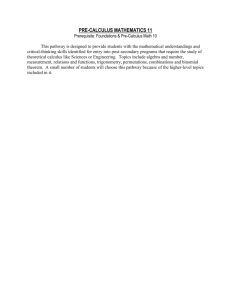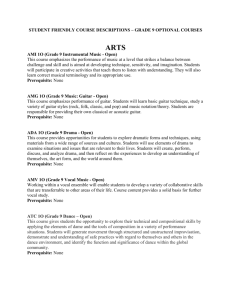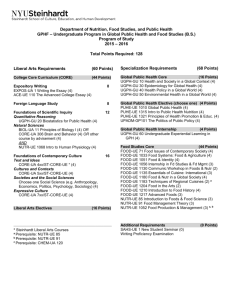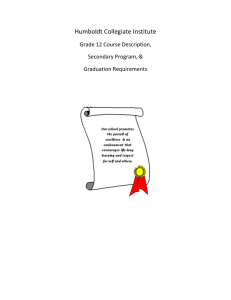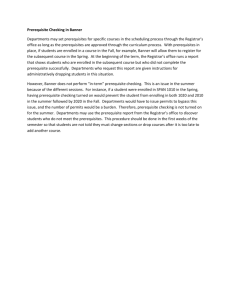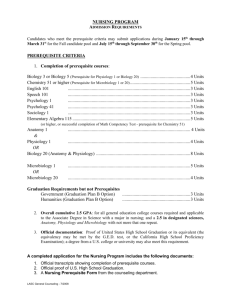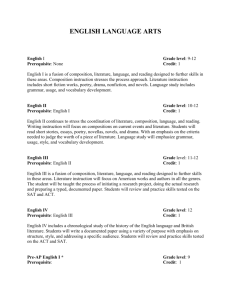Grade 11 Course Descriptions - Humboldt Collegiate Institute
advertisement
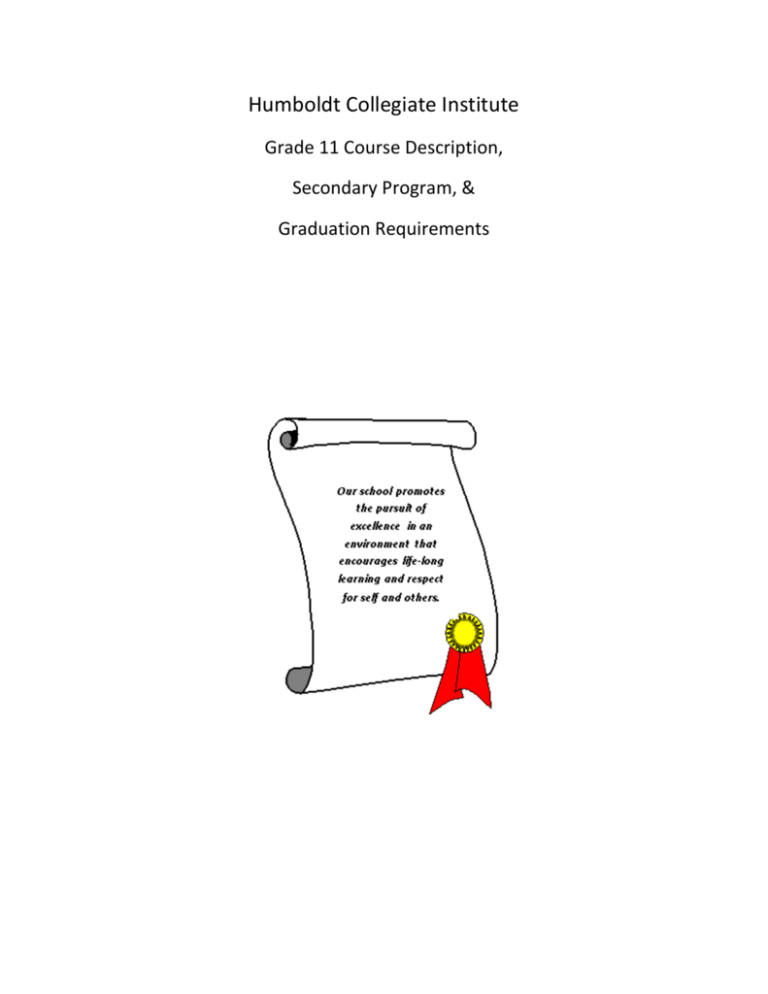
Humboldt Collegiate Institute Grade 11 Course Description, Secondary Program, & Graduation Requirements Secondary Program In order to attain a Grade Twelve standing in Saskatchewan, students must meet certain minimum requirements. This document will make you aware of these requirements and of the courses offered at Humboldt to meet the requirements. The following are terms used by The Ministry of Education in reference to the requirements for Grade Twelve standing. These terms are as follows: Credit: A one-credit course is developed or approved by Saskatchewan Education and requires a minimum of 100 hours of instruction. All classes in this document are one-credit classes. Required Course: There are certain courses of study all students must take at each grade level. These required courses are clarified further in this document. Required Area of Study: Students are required to take certain courses from an area of study, but have some choice within those areas. Required areas will be clarified in this document. The courses of study from which a student may choose will also be outlined. Elective: Students must take a certain number of courses, but there may be a great deal of choice as to what those courses might be. Courses which are taken simply because a student wishes to meet the minimum number of credits are called electives. However, it should be pointed out, that the choices as to what we can offer as electives are limited by our size. We will attempt to offer courses that meet the interests of all students. Regular Course of Study: Regular courses of study are those ending with a zero. Grade Ten courses are those numbered 10 (example, English A10), Grade Eleven courses are those numbered 20 (example, Chemistry 20), and Grade Twelve courses are those numbers 30 (example, History 30). Modified Course of Study: Modified courses, approved by the Ministry of Education, are those which end in a 1 (ELA A11). They are designed for students who have experienced difficulty in particular areas. These courses are offered in order to provide an opportunity for success for students who must successfully complete Required Courses or courses within a Required Area of Study. For example, a student must successfully complete a math class at the Grade Ten level. General Requirements for Graduation: To attain a Grade Eleven standing, all students must have successfully completed a total of 16 credits. The compulsory courses for Grade Eleven are: English Language Arts 20 Mathematics 20 Program Number of Credits Required Areas of Study Grade 10 Grade 11 Grade 12 English 2 1 2 Mathematics 1 1 Science 1 Social Science 1 Canadian Studies Specified Areas of Study 1 Grade 10, 11, or 12 Grade 11 or 12 Science 1 Social Science 1 Health/ 1 Physical Education Arts Education/ 2 Practical and Applied Arts Electives 2 7 All students are encouraged to consult with a career counsellor when choosing classes. Post-Secondary Math Requirements Students who are considering post-secondary education and taking the Workplace and Apprenticeship pathway should be aware of the opportunities that exist with credits in this pathway of mathematics. Some examples: University of Regina University of Saskatchewan none none SIAST Education (some) Fine Arts Social Work none Dental Hygiene Education assistant Graphic Communications Electrician Workplace and apprenticeship 20 Building Systems Technician (Min. of 60%) Computer Networking Technician (Min. of 60%) Pharmacy technician Workplace and Apprenticeship 30 Students who are considering post-secondary education and taking the Foundations pathway should be aware of the opportunities that exist with credits in this pathway of mathematics. Some examples: University of Regina University of Saskatchewan None None Arts Business Nursing (min 70%) SIAST Agriculture Arts and Science Kinesiology Course requirement Foundations 20 Medical Lab assistant Electrician Pharmacy Tech. Dental Assisting Nursing Foundations 30 Students who are considering post-secondary education and taking the Pre-Calculus pathway should be aware of the opportunities that exist with credits in this pathway of mathematics. Some examples: University of Regina Education (some) Fine Arts Social Work Business Engineering Science University of Saskatchewan none SIAST Engineering Business Electrician Refrigeration and air conditioning Architectural and building tech. Geomatics Technology Mechanical Engineering For more information please visit the link: http://tiny.cc/HCImath Course requirement Pre-Calculus 20 Pre-Calculus 30 MEETING CORE CURRICULUM REQUIREMENTS: 24 credits required for graduation. GRADE 10 GRADE 11 GRADE 12 Compulsory: □ English Language A10 Compulsory: □ English Language 20 Compulsory: □ English Language A30 □ English Language B10 At least one of: □ Pre-calculus □ English Language B30 □ Social Studies 10 /History10 or Native Studies 10 □ Science 10 □ Math Foundations and Precalculus □ Math Workplace and Apprenticeship □ History 30 □ Foundations □ Workplace and Apprenticeship Social Sciences requirement □ At least one of: Economics 20/30, History 20/21, Law 30, Social Studies 20/21 OR Psychology20/ 30 At least one of: □ Biology 20/30 □ Chemistry 20 □ Physics 20/30 □ At least two Arts Education or Practical & Applied Arts electives at the 10, 20 OR 30 level. □ Wellness/Physical Education: □ At least one of: Wellness10, Phys. Ed. 20 or Phys. Ed. 30 □ Unspecified Electives: Unspecified Electives: Unspecified Electives: (2 of 5 must be at the 30 level) □ 1.__________________ □ 1.________________ □ 1.__________________ □ 2.__________________ □ 2.________________ □ 2.__________________ □ 3.__________________ □ 3.________________ □ 3.__________________ □ 4.__________________ □ 4.________________ □ 4.__________________ *Grade 10’s must register in 10 classes. □ 5.________________ □ 5.__________________ □ 6.________________ □ 6.__________________ * Grade11’s must register in 9 classes. □ 7.___________________ Grade 12’s must register in 8 classes. English Language Arts Communication Studies 20 Prerequisite: English Language Arts A10 or B10 Communication Studies 20 is designed to help students further develop their oral, written, and visual communication skills. Students learn to gather, organize, deliver, and interpret information in a variety of ways including writing and presenting reports, delivering persuasive speeches, and taking part in discussions and projects. Creative Writing 20 Prerequisite: English Language Arts A10 or B10 While Creative Writing 20 is in fact a relative of English language arts, it is actually quite different. Ultimately, if you enjoy writing creatively—poetry, fiction, drama, or non-fiction—then you will quite likely be very successful in Creative Writing 20. You will explore the art and craft of creative writing by practicing the behaviours of several writers, and by writing in many forms and styles. Our primary goal in the class is to appreciate powerful writing rather than to analyze it. Students are extended a great deal of artistic and personal freedom in order that they may find their own distinct and creative written voice. English Language Arts 20 Prerequisite: English Language Arts A10 English Language Arts 20 centres around specific themes with students learning about language through purposeful and challenging experiences designed on these themes: 1. Starting Out – Beginning and Becoming (The Past and the Present; Triumphs and Trials; Discovery and Disillusionment; Relationships with Family and Others; Celebrations and Rites of Passage) 2. Moving Forward – Establishing and Realizing (Turning Points and Transitions; Evolving Roles and Responsibilities; Opportunities and Obstacles; Risks and Rewards; Beliefs and Goals) English Language Arts 21 Prerequisite: English Language Arts A10 or A11 This course is designed for students experiencing difficulties in English and it can be taken instead of English Language Arts 20. The literature study turns inward, examining the effect of outside influences on developing personalities. the themes of Childhood & Youth focus the literature study. Students continue to develop their skills in listening, speaking, writing, and reading. Media Studies 20 Prerequisite: English Language Arts A10 or B10 Media Studies 20 is designed to help students better understand mass communication. Students explore the impact of novels, magazines, photography, radio, film, video, and the emerging communication technologies. Students have an opportunity to read, view, write, and discuss critically as they examine the media that influences their lives. Units include: Intro to Media Awareness, Exploring the Medium of Television, Exploring Social Media, The World of Advertising, and Media Project. Science Biology 20 Prerequisite: Science 10 This is an introduction to the ‘study of life’. Students will learn what biology is, what biologists do, and explore career information related to the biological sciences. a survey of the living world is made from the simplest bacteria to complex mammals, looking into the diversity that exists. Students will be introduced to ecology and how living organisms relate to the physical environment and to each other. The course also includes student participation in a plant and animal care program. Chemistry 20 Prerequisite: Science 10 Students will acquire background knowledge in chemical concepts using the process of science. Students will be expected to handle laboratory equipment as well as work on group projects and research assignments including a research project for the course. The following topics are covered: 1. An overview of how chemistry affects society and how to properly handle laboratory equipment; 2. Atoms and Elements, establishes the foundation for what is to follow in Chemistry 20 and 30, the components and characteristics of atoms, the elements, and the periodic table; 3. Molecules and Compounds, deals with the types of bonds, how they are formed, and the naming, writing, and properties of compounds; 4. Chemical Reactions, involves students more heavily in the lab in an attempt to discover the wide variety of reactions which make up our world. The type of reactions as well as writing and balancing equations is the focus of this unit; 5. Mole Concept and Stoichiometry, requires students to use chemical equations to do mathematical calculations involving grams, moles, and volumes. Physics 20 Prerequisite: Science 10 This course is designed to increase each student’s awareness of the physics of everyday things. It emphasizes the relevance of physics to society, technology, and the environment. The course requires a solid understanding of mathematics. Content will be covered and discovered using various methods, such as hands-on experiments, inquiry projects and experiments, research, and direct instruction. The major topics discussed are: The Physics of Everyday Things, Wave Motion, The Nature of Light, Optics, Sound and Heat. Examples of questions you will answer during the course are: 1. Why do I see "water" on the highway during a hot day; 2. Why do diamonds sparkle more than rubies; 3. How can laser surgery improve your vision; 4. How does a fish finder work? Environmental Science 20 Prerequisite: Science 10 Students will learn how to examine local and global environmental issues such as climate change, water, soil and air quality, urbanization, bio-resource management, waste handling and disposal, land use planning, and the impacts of agriculture and industry on the environment from scientific and Indigenous knowledge perspectives. Students will examine the role of environmental policies and ethics on decision making, and will investigate environmental science related careers. Student directed studies will lead to the development of environmental action plans. Health Sciences 20 Prerequisite: Science 10 This course will challenge students to look at the health science field from holistic and analytic perspectives to provide a basis for making sound personal health choices. Students will apply information in the areas of medical knowledge systems and ethics, human anatomy and physiology, nutrition and metabolism, and medical diagnostics. Understanding the basic anatomy and physiology of the human body sill provide a context for studying the normal and abnormal functions of various body systems and the tools and techniques used to diagnose those systems. Students will also investigate the range of health science careers and post-secondary programs available in Saskatchewan. Physical Science 20 Prerequisite: Science 10 This course combines elements of Chemistry 20 and Physics 20 in an integrated hands-on manner to investigate concepts related to heating and cooling, the foundations of chemistry, including the mole and quantitative analysis of molecules and chemical reactions, and the characteristics and properties of electromagnetic radiation. An overarching theme is the study of the enterprise of public and private science as it occurs in agriculture, industry, and universities to help the students better understand the physical science related career paths. Student inquiry will guide independent investigations of physical science phenomena. Social Science Psychology 20 Psychology is the systematic study of human behaviour and experience. This introductory course provides students with a general overview of the field of psychology, including psychological theory and the methodology of research. Psychology 20 has a social psychology emphasis and focuses more on how psychology is applied rather than what it is. Students will begin to discover how psychological theories, methods, and studies lead to greater understanding of how humans think, feel, and behave. The course is designed to help students make sense of their world. History 20 Prerequisite: History 10 History 20 explores the major issues that affected society during the 20th century by examining global conflicts, world governance and human rights. The ideas of the totalitarian state, national sovereignty, collective security and selfdetermination will be examined to see how the world has developed and changed since the First World War. Students will develop and utilize dialectical thinking and conflict resolution models to understand the major events. Native Studies 20 Prerequisite: History 10 or Native Studies 10 Native Studies 20 is an investigation of current issues of concern to Indigenous peoples around the globe. Students will gain an understanding of the historical roots of current issues of concern to Indigenous peoples, explore and become aware of Aboriginal philosophies which are the foundations to Indigenous cultures, and develop a personal sense and commitment to the concept of “think globally, act locally”. This course is divided into four units including an introduction to the Indigenous worldview, the global Indigenous struggle for self-determination and self-government, development issues, and human rights from an Indigenous viewpoint. Mathematics Math Workplace and Apprenticeship 20 Prerequisite: MWA 10 This course is designed to provide students with the mathematical understandings and critical-thinking skills identified for entry into the majority of trades and for direct entry into the work force. Topics include financial mathematics, algebra, logical reasoning, geometry, and number sense. Based upon the type of post-secondary program and career choices made by students, this option is intended to meet the needs of approximately 30 – 40 percent of the student population. Math Foundations 20 Prerequisite: MF&P 10 This course is designed to provide students with the mathematical understandings and critical-thinking skills identified for postsecondary studies in programs that do not require the study of theoretical calculus. Topics include logical reasoning, proportional reasoning, geometry, trigonometry, algebra, statistics, probability and research of an event or area of interest that involves math. Based upon the type of post-secondary program and career choices made by students, this option is intended to meet the needs of approximately 40 – 60 percent of the student population. The Foundations of Mathematics pathway meets the needs of students intending to go to University, SIAST or other technical schools, but into programs that are not math intensive. Math Pre-calculus 20 Prerequisite: MF&P 10 This pathway is designed to provide students with the mathematical understandings and critical thinking skills identified for entry into post-secondary programs that require the study of theoretical calculus. Topics include absolute value, radicals, trigonometry, rational expressions and equations, factoring, quadratic functions, quadratic equations, inequalities, sequences and series, & reciprocal functions. Based upon the type of postsecondary program and career choices made by students, this option is intended to meet the needs of approximately 10 - 30 percent of the student population. The Pre-Calculus pathway meets the needs of students pursuing careers in science-related areas and areas of study that are math intensive. Arts Education and Practical & Applied Arts Accounting 20 Prerequisite: Accounting 10 The course continues the basic concepts and skills learned in Accounting 10. This time the principles are applied to merchandising businesses. Over half of the course is done on computer using Simply Accounting: an accounting program using numerous businesses. As well, a section on how to complete income tax return is studied. Band 20 Prerequisite: Prior participation in a band course This course is to further improve skills: breathing, tone quality, intonation, articulation, range development and reading skills, taught in Grade 9. The class includes traditional band literature available in a wide variety of styles and periods. Students grow as educated music performers, both individually and collectively encouraging confidence in individual and ensemble playing. Music is chosen from repertoire of Grade 3 to 5 levels. There are traditionally 2 concerts and 1 festival performance per year. Career and Work Exploration 20 This course consists of both classroom and workplace learning. It provides students with an opportunity to explore career development as well as do some career planning. The career planning process is facilitated by a wide range of interactive activities and work experience components. The focus in Career and Work Exploration 20 is on the exploration stage of the career development continuum. The placements will be a joint decision based on the student’s abilities and preferences, as well as upon the availability of a job site. You will work from 1:30 at your placement at least four days a week with Monday usually being an in-class session at HCI. Choral 20 Choral class is for anyone who enjoys music and singing in a group setting. Students learn the basics of vocal technique, how to read music, ear training and listening skills. Choir students explore a wide range of choral repertoire representing different styles of music, historical periods, cultures and languages. Students learn how to harmonize and develop the expressive techniques of performance. The program relies on active student participation making regular attendance both at rehearsals and performances mandatory. The choir performs numerous times during the year at school and community functions and usually competes each spring at the Humboldt Music Festival. The choir program strives to give each student a deeper appreciation for performing arts and provides meaningful musical experiences for all those involved. Christian Ethics 20 Christian Ethics 20 explores the need for meaning and purpose that is part of our human existence. Emphasis is placed on the role of Christianity in the global community with study on social justice issues including hunger, population, conflict, and the ethical bases for many of our contemporary moral issues. Commercial Cooking 20 This course is designed to create an awareness of and to develop entry level food preparation skills for the food service industry. The food service industry is one of the largest employers in Canada. These courses are designed to give students the skills and practical experiences necessary to enter the professional cooking trade or food service industry with confidence. The study of food and cooking methods is essential in the cooking trade; therefore, lessons for students in cooking theory reinforce practical exercises. Students are also introduced to standards of professionalism that include the elements of personal hygiene and the qualities of good workers. The objectives of the courses include: to become familiar with the post-secondary training programs in Saskatchewan; to be aware of career and job opportunities in the food service industry; to recognize, value, and develop personal skills and abilities that apply in the workplace; to participate in a work study experience in a restaurant or institutional setting; to understand and apply safety and sanitation practices when selecting, preparing, serving, and storing food; to be familiar with and practise emergency procedures; to understand basic terminology and fundamental practices related to cooking; to use, maintain, and operate common kitchen tools and equipment; to clean, prepare, cook, and store foods using techniques to achieve suitable colour, flavour, texture, and nutritive value; to understand the processes and participate in presentation of a variety of foods; to prepare and present foods in an attractive, efficient, and logical manner. Communications Media 10, 20, 30 A new course offering in 2011, Communications Media offers students an opportunity to study and understand the effects that mass media has on society. Using this understanding, students are then able to use available technology to create their own media. Skills such as video production, video editing, photography, web page design, and computer animation are all elements of this hands-on, and practical course. Design Studies 20 Design Studies allows students to gain and appreciate basic design fundamentals. Students will learn a variety of methods for problem solving through the tools of design. A variety of materials and applications will be used: air brush, mixed media, photography, technical drawing, and digital media. Modules covered will be automotive, architectural, landscape, fashion, and graphic design. Drama 20 Drama is a class for all those who love to perform. Students will have the opportunity to develop self-confidence and acting skills as they do improvisation, storytelling, scriptwriting, mime, dance, and many other aspects of drama. Students will also learn about drama as they view others acting, both on stage at HCI and as we have opportunity, viewing dramatic performances elsewhere. Students will also have the chance to learn technical theatre by applying their skills to actual dramatic performances using sound, lighting, makeup, costume design, set design, etc. Drama class explores the role of drama and theatre in culture from a historical setting to contemporary culture. Grade 10, 11, and 12 drama students are combined in this class working as grade groups, creating individuals projects, and as an entire class. Information Processing 20 Suggested Prerequisite: Information Processing 10 Information Processing is the study of turning ideas into a product, revising the product and distributing the information in product form to an audience that provides feedback. The main tool used is the computer. The focus here is on business applications of the information processing cycle. Tasks in this course are business reports, business letters, desk top publishing, photo enhancement, presentations, web page development and an introduction to Digital Video Editing. Keyboarding skills are reinforced with an emphasis on attaining job entry level skills. Life Transitions 20 This course is designed to help students face the many transitions as they grow from the dependent stage of life as a high school student to the independent stage of life as a responsible contributing member of society. Life Transitions is designed to help students manage those transitions. This course hopes to prepare students for the changes they will face in personal life, in family life, in work life, and in life as a community member. Throughout this course, students practice making decisions. This course is taught and learned through a decision making process. The course involves an orientation to the processes of the course, personal self-knowledge, relationships, time management, and career self-knowledge. Optional modules include life balance, community issues/ethics, career supports and service, and human sexuality. Music 20 Music 20/30 is a class for students who have successfully completed Guitar 10. This course takes music a step further by increasing knowledge of music theory and its application to various instruments. Students may develop further skills in guitar and explore other instruments also through independent and group study. Song-writing and mastery of various musical techniques may also be included. Practical and Applied Arts Survey 20 Suggested Prerequisite: Practical and Applied Arts 10 Students in Industrial Arts 20 have an opportunity to apply their knowledge of process learned in Industrial Arts 10 to a project of their choice. Students are given a portfolio assignment which guides them through the design process which includes designing a project on the computer, doing a cost and materials analysis, the development of a proposal, and the construction of the project(s). The process gives students an opportunity to develop critical thinking skills, positive work habits, and safe tool and shop orientation skills. Many projects have been completed in this course including chairs, tables, fishing shacks, and even an outhouse. Visual Art 20 The emphasis in this course is on personal expression in the media of drawing and painting. Skills will be developed in charcoal, pencil and ink in drawing, and painting with oils on canvas. The course will also include the exploration of sculpture, printmaking, and pottery using the potter’s wheel. Welding 20 Students in 20 are introduced to a variety of welding techniques and skills. Students are required to complete several labs which help them develop their theoretical knowledge of the welding processes. Secondly students observe demonstrations and lectures from their teacher which ultimately leads to the students completing several welds which relate to the Arc, Gas Metal Arc Welding, and Oxy-acetylene welding process. Students will also be required to write tests related to each discipline. This class is offered off location at the Carlton Trail Technical Building. Physical Education Physical Education 20 Physical Education 20 continues with the concepts acquired in Wellness 10. The aim of the Physical Education program is lifelong participation. Our desire is to allow students the opportunity to develop skills and to participate in a safe, positive environment and in turn foster a positive attitude towards a lifetime commitment to physical activity. Our goals in the Physical Education 20 program are: concept-based skill development; development of positive attitudes focusing on physical activity, fitness, self-concept, relationships with others, social behaviour and personal and group safety; and a lifestyle oriented to overall well-being. The following activity areas will be attempted with the percentage of semester time listed in each area. Unspecified Electives French 20 Prerequisite: French 10 The French 20 program continues to build on the structures and vocabulary learned in previous years. The course is taught using a communicative and experiential approach which means that focus is on developing all six strands of language development: speaking, reading, writing, listening, viewing and representation. Experiential learning provides the students the opportunity to personalize their projects to suit their interests while working on realistic second-language experiences.
